- Home
- Jean Stone
Twice Upon a Wedding Page 8
Twice Upon a Wedding Read online
Page 8
As usual, Lily was way ahead of Elaine. “Seems a little pricey for a cake,” Elaine responded. Her wedding to Lloyd had cost less than five hundred dollars in its entirety.
“That’s not the point. Some of our brides might want the option.”
Elaine couldn’t argue. She had, after all, never given her father a chance to throw a lavish restaurant wedding, though McNulty’s had been famous for making special events more special.
“Even the old ones?” Karen asked.
“Every bride wants her wedding to be unique, no matter if it’s her first or her hundred and first.”
It was not the only time Lily had claimed that, and having had three of her own, Elaine supposed she qualified as an expert. “My father always said that,” Elaine said.
“He had weddings at the restaurant?” Lily asked.
“Sure. They were so society-like at the time. By today’s standards they were pretty simple. Elegant, but simple.” She smiled, remembering. “We had one for a Reisling. They owned one Derby and two Preakness winners.”
“Your father had weddings?” Lily asked again. “Why didn’t you say so before this? What were they like? What did he do for them?”
“The Reisling one had lots of flowers. And everything was horseshoe-shaped. The bride’s bouquet, the cake, even the arch they walked through to get into the reception.”
“See?” Lily asked, moving forward on her chair and dipping a slice of bread into herbed olive oil. “The wedding was unique to them. Do you have pictures?”
“Not me. My father might, unless he’s thrown them out.”
“Can you get them?”
“What?”
“The pictures! Anything and everything he did for weddings. We might find all kinds of gems hidden in the past.” Lily poured a glass of wine for Elaine and a half a glass for Karen before Elaine could protest. “Your father must have archives with all kinds of ideas.”
Elaine blinked. “Well,” she said, “I suppose he does. He has recipes, anyway.”
“Recipes? Well, don’t you see? There must be something we can use.”
Elaine might have wanted to see her father more often, but did she want him involved in the business? Did she want him involved with her life? “We’ll see him at Christmas,” she said before dwelling on it any longer. “I’ll ask him then.”
“Christmas?” Lily shrieked. “We have a huge event for New Year’s Eve! Your father might have what we need to make it fabulous. To make Irene Benson—and the world—sit up and take notice of Second Chances.”
Elaine doubted that the world would notice, but Lily might be right about Irene Benson. “I’ll call him this weekend.”
They saved room for dessert, something chocolate and decadent. On the way out, Lily said, “Here you go, Lainey. In lieu of your cooking class.”
In a glass case by the door were several colorful cookbooks.
“For Christmas,” Elaine said without hesitation. “For my father.”
As the cashier rang up the purchase, Elaine smiled. It was a much better gift than another cardigan or handmade socks from the church fair.
And maybe, just maybe, it might be a good year to celebrate Christmas in Saratoga: a holiday makeover for her whole family. With or without the archives of the past.
16
Andrew decided to ask Jo out for a drink after work, because Cassie was right, he needed a girlfriend, and Cassie needed a mother and he couldn’t bear it if she wasted any of her years pining for Patty the way he had wasted too many of his. Tonight would be the last chance to spend time alone with Jo before chaos (translation: Lily, Sarah, Elaine) reconvened next week; the last chance to see her alone before her next date with the jerk who ate BLTs for breakfast and planned to make dinner (ha!) for her at his place.
Tonight Andrew would take her out and he would tell her the truth about who he really was and what he was doing and how he could have gone this way forever except that he was crazy about her.
He would tell her, and they would get on with things, or not, but at least he’d know, at least he would have tried for Cassie’s sake, if not his own.
The phone had been ringing all day. Inns and B&Bs looking for guests, DJs looking for a job, even a pet-grooming service for those lucky enough to be included in the nuptials.
Andrew waited until the phones, at last, stopped ringing and the sun, at last, had set. He put his feet up on his desk and said, “I need a glass of wine. Are you interested?” The asking was easier than he’d expected, as if he were tired of his game and simply wanted it over.
Jo closed her eyes and let her soft, narrow shoulders relax. “A glass of wine. After a day like today, you certainly deserve it. But I’m afraid you’ll have to count me out. I’m going to my mother’s, to go through some things.”
He resisted the urge to suggest she could do that the following night instead of going to her neighbor’s. “But your mother and Ted won’t be back from their honeymoon for a while.”
Jo stood up wearily. “If I decide not to move there,” Jo said, “she’ll put the house on the market. I have to sort through what belongs to me, and start figuring out what I should get rid of.”
Why was that more important than a drink with him?
“Would you like some help? I move boxes with much more efficiency than the way I row boats.”
“You’re a dear,” she said, “but no, thanks. I’m afraid I have to do this on my own.” She took her large leather bag from the bottom drawer of her desk, shut off her computer, and straightened pens and papers. Then she went to the coatrack and put on her cashmere jacket.
“But Cassie is spending the night canning pumpkins with Mrs. Connor.” He made what he thought was a comical face. “All in the name of pie for Thanksgiving.”
Jo laughed and said, “I’m sure you’ll survive. I’ll see you Monday. Enjoy the wine.” She closed the door behind her and it took Andrew a second to understand what it meant when she’d said “Enjoy the wine.”
What it meant was she’d rejected him. Clark Kent foiled again.
Jo stepped outside and noticed it was already dark. She buttoned her jacket and inhaled the autumn air, trying to compose herself. She’d brushed Andrew off, and she’d upset him. But there was no way she could go hang out with him. Work was one thing, but social time quite another. His invitation, after all, had been friend-to-friend. She did not want to risk him figuring out that she’d started thinking it was too bad he was gay.
17
On Saturday morning, back home on Cornflower Drive, Elaine poured herself a giant cup of coffee, took not one credit card but two, and went into Kory’s room, which once had been the sunroom, but which Lloyd and his brother Russell had converted to a bedroom when Kandie became a teenager and started pleading for her own room. The garrison-style home in the subdivision had only three bedrooms on the second floor, so Lloyd bought a Time/Life How-To-Remodel manual and he and Russell got to work.
Kory had been thrilled to be relegated far from his sisters and his parents. It had provided him with a haven in which to stockpile his sports gear at age eleven and his girlie magazines at twelve. It had also provided the unfortunate privacy for Kory to smoke marijuana at fifteen, and blow the smoke out the jalousied sunroom windows. It never had occurred to him that smoke rises, and after only two or three nights, Elaine and Lloyd had figured out that the sweet smell drifting in to their second-floor master-bedroom window was not honeysuckle. Kory was caught, grounded, and dragged off by his Uncle Russell, who also happened to be a cop, and shown firsthand what happened to addicts who ended up in doorways or crack houses and never played sports again.
Elaine had always credited Uncle Russell and basketball for saving Kory. She was reminded of it every time she cleaned his room or went in to use the computer, and looked up at the jalousied windows that had, for years now, acted as a backdrop for an orange basketball hoop instead of as a means to another kind of life.
She wondered if her father wo
uld have approved of how they’d handled the situation.
Plopping herself at the computer, Elaine knew she had to call him. But first, she would “go” shopping!
With a shudder of anticipation, she logged on and Googled “women’s fashions.” She would spend the day—the weekend if she had to—shopping online for more clothes: Elaine had been frugal too long. She would shop and she would put it all on her credit card, which she could max out like most of the rest of the world.
“Some color might be nice,” Karen had said over breakfast that morning, just before she’d left to spend the day with her father because it was the “other” of the “every other weekend,” as per Lloyd’s visitation rights. “You’ve gone from looking like Mr. Brighton’s garden to the CNN coverage in Iraq.”
Mr. Brighton lived over on Third Street and was renowned for his summer wildflower collections, none of which had roots that could be traced to the Middle East.
“Leapin’ lizards,” Elaine said when Google brought about a zillion shopping sites right into the sunroom.
She settled back and went to work, blissfully knowing she’d have no interruptions, not even from the doorbell. It was Saturday, after all, and the roses wouldn’t be there until tomorrow.
Jo didn’t know what to wear.
Jack would no doubt have on jeans, so she probably should, too, but in her years in the city she’d grown more accustomed to nice fabrics, sleek styles.
You won’t need that many clothes, her mother had said when Jo had been in the process of returning to West Hope. You won’t be in Boston. It had hurt, that reference to her former life, when she’d thought she’d had it all, when she’d thought she’d been in control, before money and success resulted in heartbreak.
“And a closet full of clothes,” she said now, as she pulled out a black silk jumpsuit that, like the suits and the dresses and the pants and the shirts stuffed in her closet, had once seemed a perfect façade for her emotionally empty shell.
Tonight, however, she’d wear the jumpsuit. She’d save the jeans for a day or a night when she felt less vulnerable, less in need of looking her sexy, she-devil best.
His living room/dining room was sparse. There was a brown futon, a card table, two folding chairs, a floor lamp, and a fake ficus tree that stood in the corner and could have used a good cleaning. A wobbly-looking bookcase was next to that, and held a stack of what appeared to be old magazines and a few books. On the top shelf were two five-by-seven frames with photos that might have been of people, but Jo couldn’t tell from the doorway.
“I never did get the hang of decorating,” Jack said. His accent was charming, his charisma alluring. He took the thirty-dollar bottle of wine that Jo could ill afford but had nonetheless brought, set it on the counter, and scooped her into his arms. “You look fabulous,” he said.
It was the first time his arms had encircled her, the first time she’d felt his full embrace. His arms were strong, his dark eyes as probing as they’d been before. She’d promised herself no sex until after dinner, until she felt justified in believing this had been a third date.
But then he kissed her.
It was a soft, full-mouth kiss that started gentle and slow, then turned more eager, more wanting, with small nibbles on her lips and ready touches of his tongue.
Her body moved more closely to his. Her breasts merged into his chest, his penis pressed against her thigh. It was hard. It was good.
The last time she’d been this close to a man . . . well, it had actually been just the other day, when she and Andrew had toppled all over each other, and she’d had the strange feeling that they’d been about to kiss.
Andrew.
God, why was she thinking about him? Andrew was gay. Jack Allen was not.
Still, she gently pushed Jack away. “Well,” she said, “if we keep doing that, your dinner will be ruined.”
He half smiled back. He placed his index finger on her lower lip. He kept his gaze on it as he drew it down in a straight line, over her chin, down her throat, into the small hollow that rested beneath, then continued down her chest and between the V where the tops of her breasts were exposed. He stopped at the zipper; he played with the tab.
“Later,” she said. If the foreplay could linger, the sex would be great. She’d read that somewhere, most likely in a self-help book on a Saturday night when she’d been alone and wondering why.
Jack laughed. “Okay,” he said. “Later. First, the wine. And the pasta.” He opened the bottle, poured two glasses, while Jo reclaimed her wits.
“Pasta?” she asked with a smile as she took a glass. “I didn’t know pasta was a tradition in Belgium.”
“What can I say? I cook as well as I decorate.” He turned to an old aluminum pot that sat on the stove. “Make yourself comfortable,” he said. “This will only take a minute.”
Jo strolled into the living area, toward the window. “Your view is the Dumpster,” she said, relaxing with every deep inhale and every slow exhale, with every small sip from her glass. “My view is the courtyard.”
“Ah, the Dumpster,” he said. “But sooner or later, if I sat by the window, I’d get to see all our neighbors.” He laughed with a good-natured laugh, then Jo heard him shake dry pasta into the water.
She moved to the bookcase and picked up one of the pictures. It was of two children, a boy and a girl, swinging on swings. “Who are the kids?” she asked.
“Gretchen and Pierre. You must say they’re beautiful, because they’re mine.”
His?
She took another drink, this time a long one.
Well, she thought, of course he had two kids. Unlike her, most people in their forties had had kids, stability, permanence of some kind. “They are beautiful,” she said, because they were. She set the frame back on the bookcase and hesitated before looking at the one next to it. With another sip of wine, she dared a glance.
Gretchen and Pierre again. This time, each holding the hand of a woman. A pretty woman, with blond hair and a fresh, cheerful smile.
Jo didn’t want to ask, but knew that she must.
“And is this their mother?”
“Yes,” Jack called from the kitchen. “That’s Mavie. She is my wife.”
18
Monday morning the bell over the front door jingled. Sarah looked up. Her eyes fell back quickly to the papers spread across the desk. “Andrew, will you take care of this woman?” She scooped up the papers and disappeared into her studio in the back room.
When she was safely out of earshot, Andrew winked at Elaine. “She didn’t know you,” he whispered. “You look terrific.”
A crooked smile crossed Elaine’s coral-colored mouth. Had she always worn lipstick or was that part of the “new” Elaine?
Unbuttoning a dark brown cardigan, she lightly fluffed her shoulder-cropped blond hair. “‘Not too much fluff,’ Lily told me. ‘Fluff is out; flat is in.’ ”
Andrew nodded as if he knew what the heck she meant.
And then she beamed. “I spent a fortune this weekend buying clothes online.”
She seemed excited, so he said, “That’s great.”
“I used to get depressed on weekends when Lloyd had the kids. But this,” she added, pointing to herself, “this is the new me. The new, energetic me.” She laughed, then looked around. “Where’s Jo?” she asked.
Andrew shrugged. “Not here yet,” he said. “She had a date Saturday night. Maybe the guy swooped her off to Brussels.”
Elaine hesitated a moment, then ambled to one of the mirrors on the wall. “Brussels,” she said. “How romantic.”
Romantic. Romantic, his ass. He shifted on his chair. There was only one reason a guy would take Jo to Brussels, and it didn’t have anything to do with romance.
“I can’t believe Jo’s seeing a guy she met in the garage where she lives.” Elaine fixed her hair again, then added, “It used to make me sad every time I heard about a woman over forty who’d started dating again. I mean, true, I�
�d dated Martin ‘late in life,’ but I’d known the man for years. We were on several of the same town committees, did you know that?”
Andrew admitted he hadn’t.
“Then, gosh, it seemed more than sad—it seemed a little scary—that someone as smart and beautiful as Jo had resorted to picking up a stranger in a parking garage. Do you know what I mean?”
Yes, well, that he definitely could relate to.
Elaine giggled and turned back to him. “Of course, when I thought those things, I was still a brunette. Now it all seems exciting! Erotic! It seems like so much fun!”
Andrew crumpled a paper, flung it in the basket.
Elaine turned from the mirror and sank into the French provincial chair behind Jo’s desk. “Maybe I’ll go to Belgium, someday. Or London. I’m forty-three years old and I’ve never been to London!”
“Make it a priority,” Andrew replied.
“Okay. Right after the Benson wedding.” She touched the lipstick at the corner of her mouth as if it felt like something foreign. “Do you think I’ll ever meet a handsome prince the way Jo has?”
“I think any man would be a fool to pass you by,” he said. Elaine stood up and laughed a sweet, innocent laugh.
“Oh, Andrew,” she said, “you’re such good medicine for this bunch of middle-aged, dowager women.”
“‘Dowager’?” It was Andrew’s turn to laugh; Andrew’s turn to remember that his job at Second Chances truly was one of the good parts of his life. “I can think of many words. ‘Dowager’ is not one of them.”
Elaine laughed, too, then simulated a haughty prance. “I think I’ll go tell Ms. Sarah she must pay better attention when a potential customer sashays through our door,” she said, then winked at Andrew and strutted toward Sarah’s workroom.
Andrew looked back to the door and wondered when—if—Jo was going to show up.

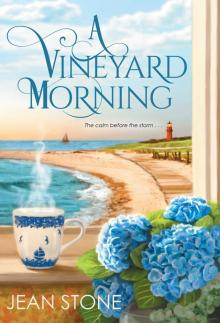 A Vineyard Morning
A Vineyard Morning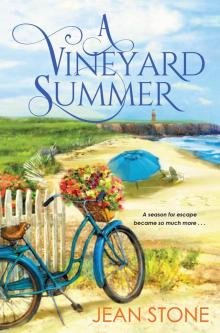 A Vineyard Summer
A Vineyard Summer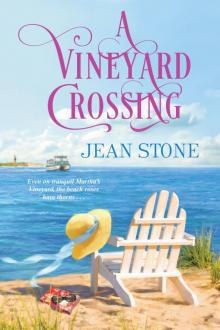 A Vineyard Crossing
A Vineyard Crossing A Vineyard Christmas
A Vineyard Christmas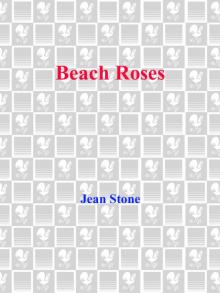 Beach Roses
Beach Roses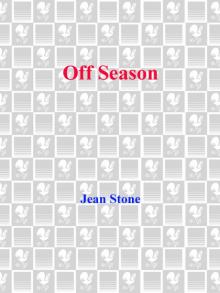 Off Season
Off Season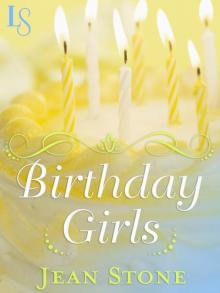 Birthday Girls
Birthday Girls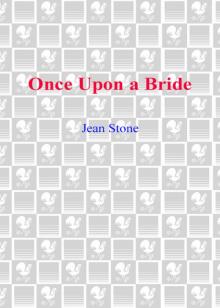 Once Upon a Bride
Once Upon a Bride Places by the Sea
Places by the Sea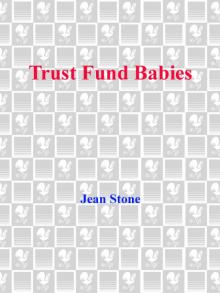 Trust Fund Babies
Trust Fund Babies The Summer House
The Summer House Tides of the Heart
Tides of the Heart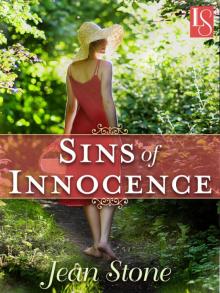 Sins of Innocence
Sins of Innocence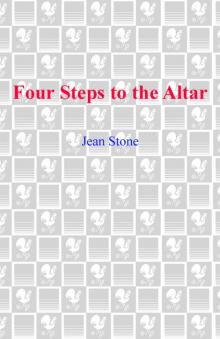 Four Steps to the Altar
Four Steps to the Altar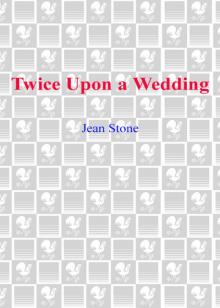 Twice Upon a Wedding
Twice Upon a Wedding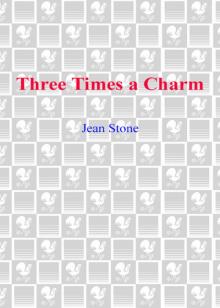 Three Times a Charm
Three Times a Charm